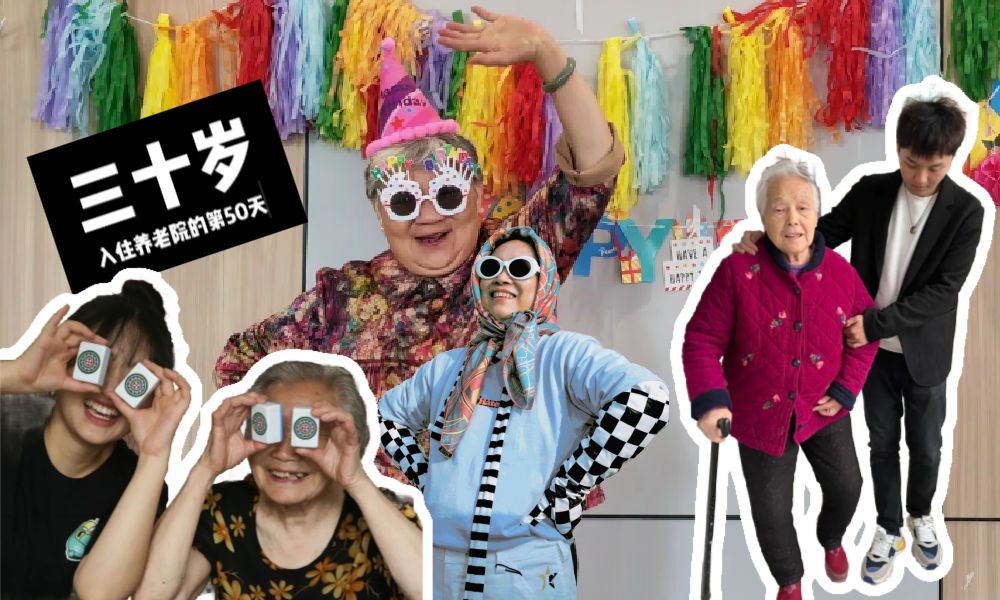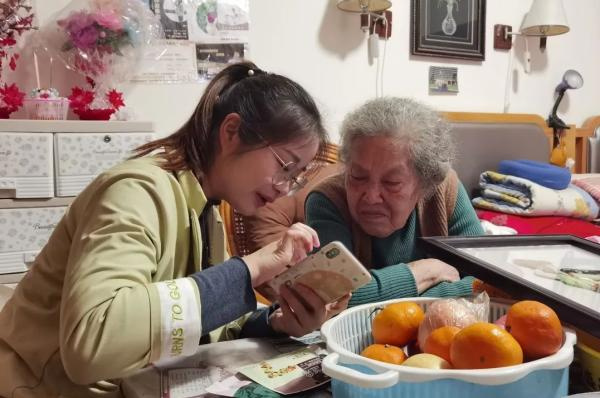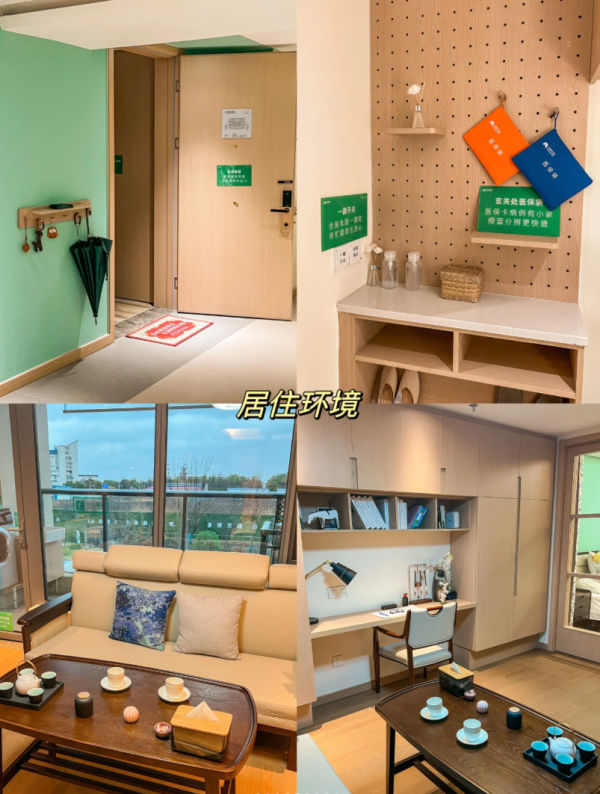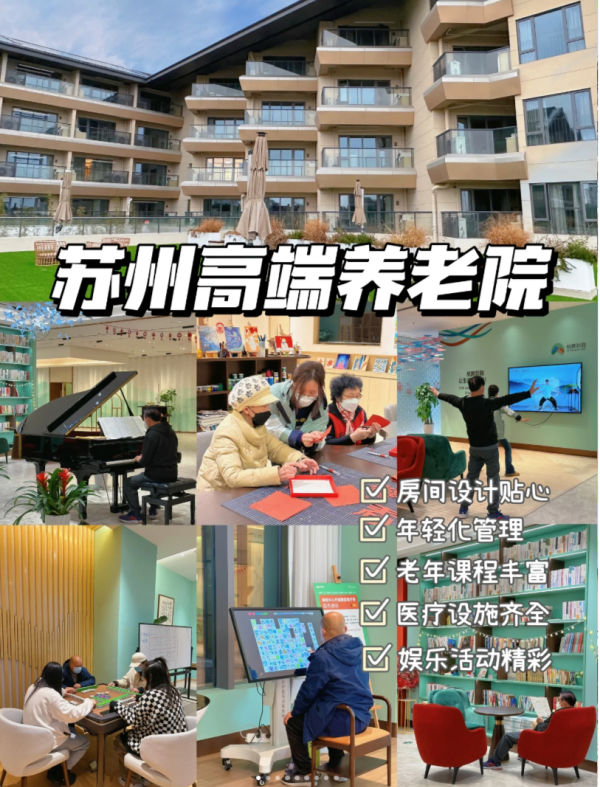China Society
“Elderlies” in Their Thirties: The Growing Interest of Chinese Youth in Nursing Homes
Some Chinese nursing homes are evolving into sought-after havens where China’s younger people can “lie flat” without worrying about meals and household chores, while enjoying a high-quality lifestyle.
Published
8 months agoon
By
Zilan Qian
Chinese nursing homes are changing their image in the social media age. While Chinese vloggers experiment with living in old people’s homes, and nursing homes are modernizing their facilities, some senior care centers are offering young people the chance to reside in their communities for free – as long as they spend some time with their elderly residents.
In China, nursing homes (养老院, yǎnglǎoyuàn) are usually not linked to lively living spaces. Many picture elderly residents trapped in dull daily routines, lacking companionship, without any visitors or children around, simply awaiting the inevitable alone.
However, these places, once synonymous with boredom, loneliness, and the end of life, are now piquing the interest of younger generations in China, breathing new life into them and transforming them into more vibrant living communities.
Recently, a nursing home in Hangzhou, Zhejiang Province, began to recruit young people to live there. The initiative is a part of the “Companion Aging Program” promoted by the local civil affair bureau.
Its objective is twofold. One the one hand, it provides new living environments for younger generations facing difficulties in securing housing. On the other hand, it alleviates the burden of social isolation on seniors who struggle to stay in touch with the communities around them.
The program is focused on attracting young people, especially those who have just entered the workforce. They can stay in one-bedroom apartments within nursing homes for free, with only a small monthly management fee of 300 yuan ($41). The only requirement is that they spend at least ten hours each month engaging in activities with elderly residents, like sharing meals, going for walks, or having conversations.

A young resident is accompanying an elderly at the nursing home. Image via The Paper.
The government initiators stress the program’s win-win situation. A staff member at the bureau explains, “The program can provide accompany to satisfy seniors’ emotional needs, while also helping ‘companions’ to save on rental costs.”
To ensure that the program is indeed mutually beneficial, the government has established specific criteria for potential senior companions. These requirements include not having current residents in the city, holding at least a junior college education level, and having desirable backgrounds in fields such as medicine, psychology, information technology, arts, or law.
The program has been well-received thus far. In a Weibo poll with the hashtag “Are you willing to live in nursing homes for free by accompanying old people?” (#你愿意陪伴老年人免费入住养老院吗#), initiated by Xinjin News (@新京报), 55% of the respondents wholeheartedly support the initiative, while approximately 30% remain undecided.
According to another recent Weibo post by Sina News, the nursing home has already received hundreds of resumes from applicants.
“The Old Man in His Thirties”: Young People Who Want to Live in Nursing Homes
In the meantime, living in nursing homes seems to have become increasingly popular among young people in China, even when it’s not always free of charge. Nursing homes have not only been portrayed in more favorable lights on social media by state media outlets, they have also taken proactive measures themselves to improve their image.
Thanks to these collective efforts, what were once seen as lonely and uninspiring places are now seemingly transforming into popular residences where China’s younger people can “lie flat” (read more), without worrying about meals and household chores, while enjoying a high-quality lifestyle.
On social app Xiaohongshu, one user named “The Old Man in His Thirties” (三旬老汉) has recently been documenting his experience of moving to a nursing home.
In his first video, somewhat jokingly, he talks about quitting his job due to overwhelming work demands and choosing to embrace a “lie-flat” lifestyle (“躺平”). He was drawn to the nursing home because it provides meals, takes care of residents, and handles daily chores.
Titled “Day xx of living in a nursing home at the age of thirty” (“三十岁入住养老院的第xx天”), his subsequent videos showcase the nursing home staff preparing delicious meals for him, getting him snacks, and even engaging in esports activities with him. These videos also feature his humorous interactions with his roommate, a senior resident in his seventies.
Another post-95 generation Xiaohongshu user (久久姨家政) recently also shared his experiences of living in an old people’s home. His videos revolve around talking to older residents, enjoying meals with them or joking around. There are also other accounts, all young Chinese vloggers, sharing their own journeys of moving into senior care facilities.

This 25-year-old vlogger shared his experiences of living in a nursing home.
Although these videos are apparently filmed based on written scripts, many netizens still see the attractiveness of nursing homes through these kinds of videos and posts. Many viewers have left comments under these videos expressing their desire to reside in senior living communities, asking for locations and inquiring about the costs.
Since the first video by “The Old Man in His Thirties” was posted in mid-June, the series has documented approximately 70 days of life in the nursing home. By now, the account has nearly 60,000 followers, and the videos accumulated thousands of likes.
In addition to improving their image through social media, some nursing homes in China have also enhanced their appeal by upgrading facilities. Gyms, swimming pools, snooker tables, free wifi and esports rooms – a variety of amenities have been introduced to transform nursing homes into modern spaces that also cater to the preferences of younger individuals.
Some private nursing homes also market themselves as “nursing homes even young people would want to live in,” emphasizing the exceptional quality and modern standards of services and facilities.

A Xiaohongshu blogger promoting a private nursing home equipped with gyms, swimming pools, and spa services under the title “what does it feel like to live in nursing homes in the thirties?”
This online promotion has had the surprising by-effect that younger and middle-aged people are also changing their attitudes about moving into nursing homes when they are old and retired.

Hiaohongshu user experiencing life in a nursing home in Suzhou: “I’m only 20 years old and living in an old people’s home already!”
While some nursing homes across the country are offering free short stays for young Chinese, other individuals have gone as far as paying for a short stay to personally experience various nursing homes. One Xiaohongshu user, after spending a night at a local upscale nursing home and sharing her experience with a friend, commented, “After the immersive experience, I’m eager to apply for long-term residency right away.”
A Path to Change Eldercare in Aging China
The growing interest of young people in nursing homes is not merely a coincidental trend arising from local government initiatives or viral social media trends.
Elderly care services have been a significant focal point of China’s national strategies for several years, driven by the projected fourfold increase in the elderly population, from 36 million to 150 million, in the next three decades.
In early May of this year, the government issued guidelines aimed at establishing a comprehensive elderly care system by 2025. These guidelines emphasize the provision of material support to elderly individuals living alone, which includes the improvement of services and facilities within nursing homes.
This increased focus on nursing homes may indicate a shift in China’s eldercare strategies, particularly in light of the significant decline in birth rates. From 2011 to 2020, China prioritized a home-based eldercare system, encouraging younger generations to live in close proximity to their elderly relatives through restructured healthcare facilities and the promotion of filial piety.
Between 2015 and 2020, the central government allocated 5 billion yuan (approximately USD 743 million) to support new pilot programs for home-based elderly care services (Krings et al 2022).
However, with record-low marriage and birth rates, it is likely that a significant number of young people today will later lack the younger family members needed to provide home-based care as they age. Consequently, nursing homes are bound to play a more crucial role in China’s future eldercare industry.

Xiaohongshu post promoting a Suzhou high-end nursing home.
In Chinese society, older adults residing in nursing homes are often regarded as examples of personal failures for not having loving families with caring children (Luo & Zhan 2911). Moreover, concerns about potential mistreatment of vulnerable elderly residents by staff members at nursing homes persist.
The increasing interest and recent active involvement of young people in nursing homes offer a way to challenge old stereotypes and bring new ideas to the changing eldercare landscape in China. Perhaps most importantly, it helps combat the loneliness that many seniors face while bridging the gap between the country’s younger and older generations.
By Zilan Qian
Follow @whatsonweibo
References (other sources hyperlinked in text):
Krings, Marion F., Jeroen D. van Wijngaarden, Shasha Yuan, and Robbert Huijsman. 2022. “China’s Elder Care Policies 1994–2020: A Narrative Document Analysis.” International Journal of Environmental Research and Public Health 19, no. 10: 6141.
Luo, Baozhen, and Heying Zhan. 2011. “Filial Piety and Functional Support: Understanding Intergenerational Solidarity among Families with Migrated Children in Rural China.” Ageing International 37, no. 1: 69–92.
This article has been edited for clarity by Manya Koetse
Get the story behind the hashtag. Subscribe to What’s on Weibo here to receive our newsletter and get access to our latest articles:
Spotted a mistake or want to add something? Please let us know in comments below or email us. First-time commenters, please be patient – we will have to manually approve your comment before it appears.
©2023 Whatsonweibo. All rights reserved. Do not reproduce our content without permission – you can contact us at info@whatsonweibo.com.
Zilan Qian is a China-born undergraduate student at Barnard College majoring in Anthropology. She is interested in exploring different cultural phenomena, loves people-watching, and likes loitering in supermarkets and museums.

China Insight
The Tragic Story of “Fat Cat”: How a Chinese Gamer’s Suicide Went Viral
The story of ‘Fat Cat’ has become a hot topic in China, sparking widespread sympathy and discussions online.
Published
1 week agoon
May 9, 2024
The tragic story behind the recent suicide of a 21-year-old Chinese gamer nicknamed ‘Fat Cat’ has become a major topic of discussion on Chinese social media, touching upon broader societal issues from unfair gender dynamics to businesses taking advantage of grieving internet users.
The story of a 21-year-old Chinese gamer from Hunan who committed suicide has gone completely viral on Weibo and beyond this week, generating many discussions.
In late April of this year, the young man nicknamed ‘Fat Cat’ (胖猫 Pàng Māo, literally fat or chubby cat), tragically ended his life by jumping into the river near the Chongqing Yangtze River Bridge (重庆长江大桥) following a breakup with his girlfriend. By now, the incident has come to be known as the “Fat Cat Jumping Into the River Incident” (胖猫跳江事件).
News of his suicide soon made its rounds on the internet, and some bloggers started looking into what was behind the story. The man’s sister also spoke out through online channels, and numerous chat records between the young man and his girlfriend emerged online.
One aspect of his story that gained traction in early May is the revelation that the man had invested all his resources into the relationship. Allegedly, he made significant financial sacrifices, giving his girlfriend over 510,000 RMB (approximately 71,000 USD) throughout their relationship, in a time frame of two years.
When his girlfriend ended the relationship, despite all of his efforts, he was devastated and took his own life.
The story was picked up by various Chinese media outlets, and prominent social and political commentator Hu Xijin also wrote a post about Fat Cat, stating the sad story had made him tear up.
As the news spread, it sparked a multitude of hashtags on Weibo, with thousands of netizens pouring out their thoughts and emotions in response to the story.
Playing Games for Love
The main part of this story that is triggering online discussions is how ‘Fat Cat,’ a young man who possessed virtually nothing, managed to provide his girlfriend, who was six years older, with such a significant amount of money – and why he was willing to sacrifice so much in order to do so.
The young man reportedly was able to make money by playing video games, specifically by being a so-called ‘booster’ by playing with others and helping them get to a higher level in multiplayer online battle games.
According to his sister, he started working as a ‘professional’ video gamer as a means of generating money to satisfy his girlfriend, who allegedly always demanded more.
He registered a total of 36 accounts to receive orders to play online games, making 20 yuan per game (about $2.80). Because this consumed all of his time, he barely went out anymore and his social life was dead.
In order to save more money, he tried to keep his own expenses as low as possible, and would only get takeout food for himself for no more than 10 yuan ($1,4). His online avatar was an image of a cat saying “I don’t want to eat vegetables, I want to eat McDonald’s.”

The woman in question who he made so many sacrifices for is named Tan Zhu (谭竹), and she soon became the topic of public scrutiny. In one screenshot of a chat conversation between Tan and her boyfriend that leaked online, she claimed she needed money for various things. The two had agreed to get married later in this year.
Despite of this, she still broke up with him, driving him to jump off the bridge after transferring his remaining 66,000 RMB (9135 USD) to Tan Zhu.
As the story fermented online, Tan Zhu also shared her side of the story. She claimed that she had met ‘Fat Cat’ over two years ago through online gaming and had started a long distance relationship with him. They had actually only met up twice before he moved to Chongqing. She emphasized that financial gain was never a motivating factor in their relationship.
Tan additionally asserted that she had previously repaid 130,000 RMB (18,000 USD) to him and that they had reached a settlement agreement shortly before his tragic death.
Ordering Take-Out to Mourn Fat Cat
– “I hope you rest in peace.”
– “Little fat cat, I hope you’ll be less foolish in your next life.”
– “In your next life, love yourself first.”
These are just a few of the messages left by netizens on notes attached to takeout food deliveries near the Chongqing Yangtze River Bridge.
As Fat Cat’s story stirred up significant online discussion, with many expressing sympathy for the young man who rarely indulged in spending on food and drinks, some internet users took the step of ordering McDonalds and other food delivery services to the bridge, where he tragically jumped from, in his honor.
This soon snowballed into more people ordering food and drinks to the bridge, resulting in a constant flow of delivery staff and a pile-up of take-out bags.

Delivery food on the bridge, photo via Weibo.
However, as the food delivery efforts picked up pace, it came to light that some of the deliveries ordered and paid for were either empty or contained something different; certain restaurants, aware of the collective effort to honor the young man, deliberately left the food boxes empty or substituted sodas or tea with tap water.

At least five restaurants were caught not delivering the actual orders. Chinese bubble tea shop ChaPanda was exposed for substituting water for milk tea in their cups. On May 3rd, ChaPanda responded that they had fired the responsible employee.
Another store, the Zhu Xiaoxiao Luosifen (朱小小螺蛳粉), responded on that they had temporarily closed the shop in question to deal with the issue. Chinese fast food chain NewYobo (牛约堡) also acknowledged that at least twenty orders they received were incomplete.
Fast food company Wallace (华莱士) responded to the controversy by stating they had dismissed the employees involved. Mixue Ice Cream & Tea (蜜雪冰城) issued an apology and temporarily closed one of their stores implicated in delivering empty orders.
In the midst of all the controversy, Fat Cat’s sister asked internet users to refrain from ordering take-out food as a means of mourning and honoring her brother.
Nevertheless, take-out food and flowers continued to accumulate near the bridge, prompting local authorities to think of ways of how to deal with this unique method of honoring the deceased gamer.
Gamer Boy Meets Girl
On Chinese social media, this story has also become a topic of debate in the context of gender dynamics and social inequality.
There are some male bloggers who are angry with Tan Zhu, suggesting her behaviour is an example of everything that’s supposedly “wrong” with Chinese women in this day and age.
Others place blame on Fat Cat for believing that he could buy love and maintain a relationship through financial means. This irked some feminist bloggers, who see it as a chauvinistic attitude towards women.
A main, recurring idea in these discussions is that young Chinese men such as Fat Cat, who are at the low end of the social ladder, are actually particularly vulnerable in a fiercely competitive society. Here, a gender imbalance and surplus of unmarried men make it easier for women to potentially exploit those desperate for companionship.
The story of Fat Cat brings back memories of ‘Mo Cha Official,’ a not-so-famous blogger who gained posthumous fame in 2021 when details of his unhappy life surfaced online.
Likewise, the tragic tale of WePhone founder Su Xiangmao (苏享茂) resurfaces. In 2017, the 37-year-old IT entrepreneur from Beijing took his own life, leaving behind a note alleging blackmail by his 29-year-old ex-wife, who demanded 10 million RMB (±1.5 million USD) (read story).
Another aspect of this viral story that is mentioned by netizens is how it gained so much attention during the Chinese May holidays, coinciding with the tragic news of the southern China highway collapse in Guangdong. That major incident resulted in the deaths of at least 48 people, and triggered questions over road safety and flawed construction designs. Some speculate that the prominence given to the Fat Cat story on trending topic lists may have been a deliberate attempt to divert attention away from this incident.
‘Fat Cat’ was cremated. His family stated their intention to take necessary legal steps to recover the money from his former girlfriend, but Tan Zhu reportedly already reached an agreement with the father and settled the case. Nevertheless, the case continues to generate discussions online, with some people wondering: “Is it over yet? Can we talk about something different now?”

Fat Cat images projected in Times Square
However, given that images of the ‘Fat Cat’ avatar have even appeared in Times Square in New York by now (Chinese internet users projected it on one of the big LED screens), it’s likely that this story will be remembered and talked about for some time to come.
By Manya Koetse
– With contributions by Miranda Barnes and Ruixin Zhang
Independently reporting China trends for over a decade. Like what we do? Support us and get the story behind the hashtag by subscribing:
Spotted a mistake or want to add something? Please let us know in comments below or email us. First-time commenters, please be patient – we will have to manually approve your comment before it appears.
©2024 Whatsonweibo. All rights reserved. Do not reproduce our content without permission – you can contact us at info@whatsonweibo.com.
China Brands, Marketing & Consumers
A Brew of Controversy: Lu Xun and LELECHA’s ‘Smoky’ Oolong Tea
Chinese tea brand LELECHA faced backlash for using the iconic literary figure Lu Xun to promote their “Smoky Oolong” milk tea, sparking controversy over the exploitation of his legacy.
Published
2 weeks agoon
May 3, 2024
It seemed like such a good idea. For this year’s World Book Day, Chinese tea brand LELECHA (乐乐茶) put a spotlight on Lu Xun (鲁迅, 1881-1936), one of the most celebrated Chinese authors the 20th century and turned him into the the ‘brand ambassador’ of their special new “Smoky Oolong” (烟腔乌龙) milk tea.
LELECHA is a Chinese chain specializing in new-style tea beverages, including bubble tea and fruit tea. It debuted in Shanghai in 2016, and since then, it has expanded rapidly, opening dozens of new stores not only in Shanghai but also in other major cities across China.
Starting on April 23, not only did the LELECHA ‘Smoky Oolong” paper cups feature Lu Xun’s portrait, but also other promotional materials by LELECHA, such as menus and paper bags, accompanied by the slogan: “Old Smoky Oolong, New Youth” (“老烟腔,新青年”). The marketing campaign was a joint collaboration between LELECHA and publishing house Yilin Press.

Lu Xun featured on LELECHA products, image via Netease.
The slogan “Old Smoky Oolong, New Youth” is a play on the Chinese magazine ‘New Youth’ or ‘La Jeunesse’ (新青年), the influential literary magazine in which Lu’s famous short story, “Diary of a Madman,” was published in 1918.
The design of the tea featuring Lu Xun’s image, its colors, and painting style also pay homage to the era in which Lu Xun rose to prominence.
Lu Xun (pen name of Zhou Shuren) was a leading figure within China’s May Fourth Movement. The May Fourth Movement (1915-24) is also referred to as the Chinese Enlightenment or the Chinese Renaissance. It was the cultural revolution brought about by the political demonstrations on the fourth of May 1919 when citizens and students in Beijing paraded the streets to protest decisions made at the post-World War I Versailles Conference and called for the destruction of traditional culture[1].
In this historical context, Lu Xun emerged as a significant cultural figure, renowned for his critical and enlightened perspectives on Chinese society.
To this day, Lu Xun remains a highly respected figure. In the post-Mao era, some critics felt that Lu Xun was actually revered a bit too much, and called for efforts to ‘demystify’ him. In 1979, for example, writer Mao Dun called for a halt to the movement to turn Lu Xun into “a god-like figure”[2].
Perhaps LELECHA’s marketing team figured they could not go wrong by creating a milk tea product around China’s beloved Lu Xun. But for various reasons, the marketing campaign backfired, landing LELECHA in hot water. The topic went trending on Chinese social media, where many criticized the tea company.
Commodification of ‘Marxist’ Lu Xun
The first issue with LELECHA’s Lu Xun campaign is a legal one. It seems the tea chain used Lu Xun’s portrait without permission. Zhou Lingfei, Lu Xun’s great-grandson and president of the Lu Xun Cultural Foundation, quickly demanded an end to the unauthorized use of Lu Xun’s image on tea cups and other merchandise. He even hired a law firm to take legal action against the campaign.
Others noted that the image of Lu Xun that was used by LELECHA resembled a famous painting of Lu Xun by Yang Zhiguang (杨之光), potentially also infringing on Yang’s copyright.
But there are more reasons why people online are upset about the Lu Xun x LELECHA marketing campaign. One is how the use of the word “smoky” is seen as disrespectful towards Lu Xun. Lu Xun was known for his heavy smoking, which ultimately contributed to his early death.
It’s also ironic that Lu Xun, widely seen as a Marxist, is being used as a ‘brand ambassador’ for a commercial tea brand. This exploits Lu Xun’s image for profit, turning his legacy into a commodity with the ‘smoky oolong’ tea and related merchandise.
“Such blatant commercialization of Lu Xun, is there no bottom limit anymore?”, one Weibo user wrote. Another person commented: “If Lu Xun were still alive and knew he had become a tool for capitalists to make money, he’d probably scold you in an article. ”
On April 29, LELECHA finally issued an apology to Lu Xun’s relatives and the Lu Xun Cultural Foundation for neglecting the legal aspects of their marketing campaign. They claimed it was meant to promote reading among China’s youth. All Lu Xun materials have now been removed from LELECHA’s stores.

Statement by LELECHA.
On Chinese social media, where the hot tea became a hot potato, opinions on the issue are divided. While many netizens think it is unacceptable to infringe on Lu Xun’s portrait rights like that, there are others who appreciate the merchandise.
The LELECHA controversy is similar to another issue that went trending in late 2023, when the well-known Chinese tea chain HeyTea (喜茶) collaborated with the Jingdezhen Ceramics Museum to release a special ‘Buddha’s Happiness’ (佛喜) latte tea series adorned with Buddha images on the cups, along with other merchandise such as stickers and magnets. The series featured three customized “Buddha’s Happiness” cups modeled on the “Speechless Bodhisattva” (无语菩萨), which soon became popular among netizens.

The HeyTea Buddha latte series, including merchandise, was pulled from shelves just three days after its launch.
However, the ‘Buddha’s Happiness’ success came to an abrupt halt when the Ethnic and Religious Affairs Bureau of Shenzhen intervened, citing regulations that prohibit commercial promotion of religion. HeyTea wasted no time challenging the objections made by the Bureau and promptly removed the tea series and all related merchandise from its stores, just three days after its initial launch.
Following the Happy Buddha and Lu Xun milk tea controversies, Chinese tea brands are bound to be more careful in the future when it comes to their collaborative marketing campaigns and whether or not they’re crossing any boundaries.
Some people couldn’t care less if they don’t launch another campaign at all. One Weibo user wrote: “Every day there’s a new collaboration here, another one there, but I’d just prefer a simple cup of tea.”
By Manya Koetse
[1]Schoppa, Keith. 2000. The Columbia Guide to Modern Chinese History. New York: Columbia UP, 159.
[2]Zhong, Xueping. 2010. “Who Is Afraid Of Lu Xun? The Politics Of ‘Debates About Lu Xun’ (鲁迅论争lu Xun Lun Zheng) And The Question Of His Legacy In Post-Revolution China.” In Culture and Social Transformations in Reform Era China, 257–284, 262.
Independently reporting China trends for over a decade. Like what we do? Support us and get the story behind the hashtag by subscribing:
Spotted a mistake or want to add something? Please let us know in comments below or email us. First-time commenters, please be patient – we will have to manually approve your comment before it appears.
©2024 Whatsonweibo. All rights reserved. Do not reproduce our content without permission – you can contact us at info@whatsonweibo.com.
Subscribe

Singing Competition or Patriotic Fight? Hunan TV’s ‘Singer 2024’ Stirs Nationalistic Sentiments

The Tragic Story of “Fat Cat”: How a Chinese Gamer’s Suicide Went Viral

A Brew of Controversy: Lu Xun and LELECHA’s ‘Smoky’ Oolong Tea

Weibo Watch: The Battle for the Bottom Bed

Zara Dress Goes Viral in China for Resemblance to Haidilao Apron

The Tragic Story of “Fat Cat”: How a Chinese Gamer’s Suicide Went Viral

The Chinese Viral TikTok Song Explained (No, It’s Not About Samsung)

The ‘Two Sessions’ Suggestions: Six Proposals Raising Online Discussions

“Old Bull Eating Young Grass”: 86-Year-Old Chinese Painter Fan Zeng Marries 36-Year-Old Xu Meng

Top 9 Chinese Movies to Watch This Spring Festival Holiday

More than Malatang: Tianshui’s Recipe for Success

A Brew of Controversy: Lu Xun and LELECHA’s ‘Smoky’ Oolong Tea

Party Slogan, Weibo Hashtag: “The Next China Will Still Be China”

From Pitch to Politics: About the Messy Messi Affair in Hong Kong (Updated)

Chengdu Disney: The Quirkiest Hotspot in China
Get in touch
Would you like to become a contributor, or do you have any tips or suggestions? Get in touch here!
Popular Reads
-

 China Insight1 week ago
China Insight1 week agoThe Tragic Story of “Fat Cat”: How a Chinese Gamer’s Suicide Went Viral
-

 China Music2 months ago
China Music2 months agoThe Chinese Viral TikTok Song Explained (No, It’s Not About Samsung)
-

 China Insight2 months ago
China Insight2 months agoThe ‘Two Sessions’ Suggestions: Six Proposals Raising Online Discussions
-

 China Arts & Entertainment1 month ago
China Arts & Entertainment1 month ago“Old Bull Eating Young Grass”: 86-Year-Old Chinese Painter Fan Zeng Marries 36-Year-Old Xu Meng



